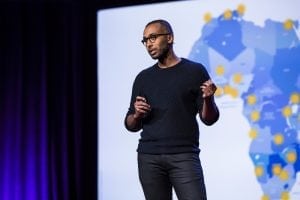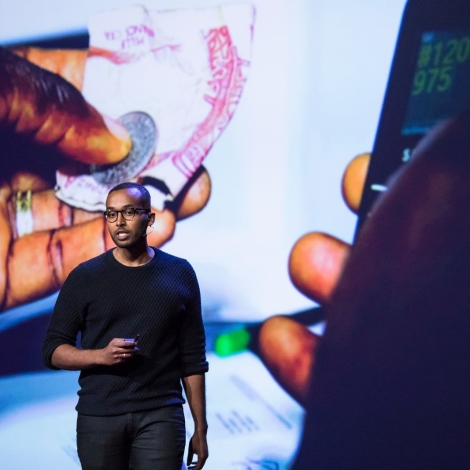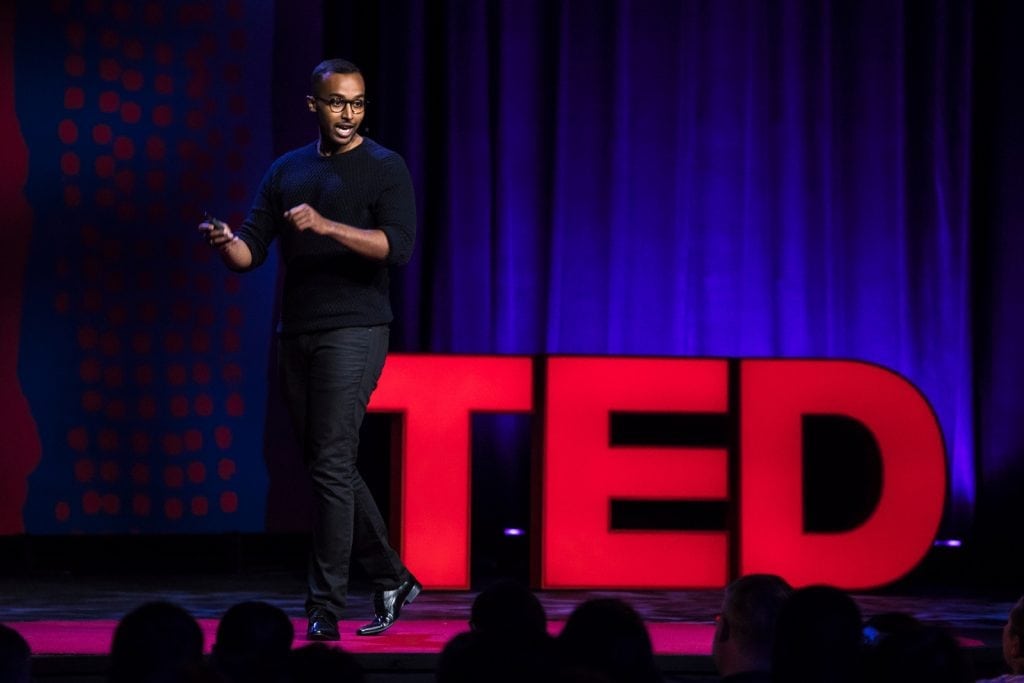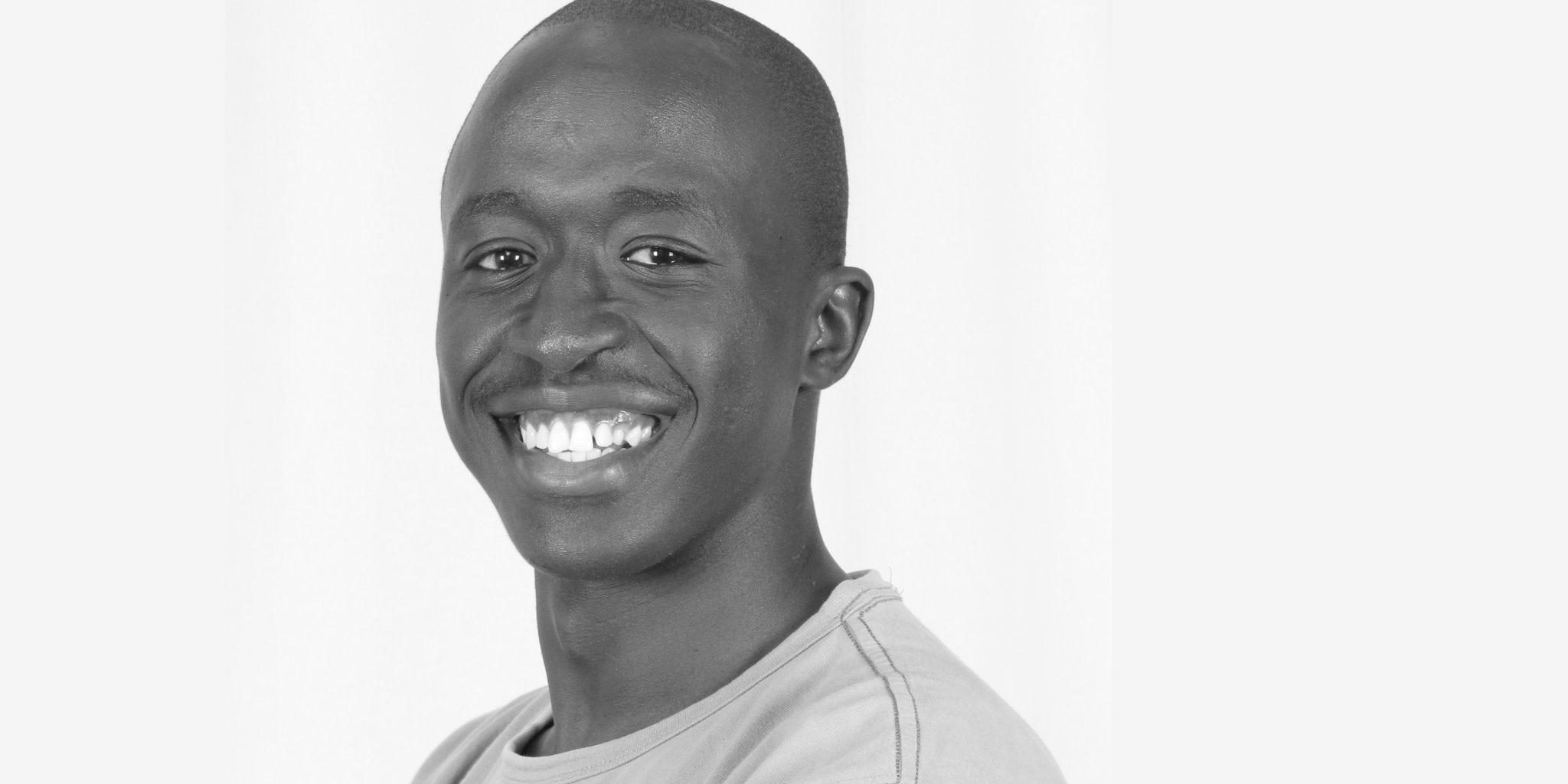
Abdigani Diriye speaks at TEDGlobal 2017 – Builders, Truth Tellers, Catalysts – August 27-30, 2017, in Arusha, Tanzania. Photo: Ryan Lash / TED (CC BY-ND 2.0)
When Abdigani Diriye was five years old, his family fled the violence of Somalia’s civil war and moved to London. Since that upset in the 1980s, Dr. Diriye has thrived in the comparative stability of countries in peacetime. He earned a doctorate in computer science at University College London, then won research roles, first at Carnegie Mellon University in Pittsburgh, Pennsylvania (USA) and finally at IBM in Nairobi, Kenya.
Now he has turned his attention back to Somalia and Somaliland. In 2012, he founded the startup accelerator Innovate Ventures to boost the region’s technology sector, and the program is gaining popularity.
“To date, we’ve received over 500 applications for our programs, trained over 25 startups and will be dispensing $25k in seed investment this year alone,” Dr. Diriye says.
The accelerator has worked with Oxfam, VC4Africa and Telesom and may have more partnerships with private industry in the pipeline.
“We have seen over the years that there is a strong interest from a number of private sector companies in Somalia who are looking to invest in startups; we wanted to bring the likes of these companies on board to help catalyze the ecosystem. We are also hoping to persuade the Somali diaspora, including some of my colleagues at IBM, to donate their skills and invest in the local technology scene in Somalia.” Dr. Diriye says.
Now a research scientist at IBM Research Africa, Dr. Diriye manages the Inclusive Financial Services Group. The group applies creative technological solutions to overcome unique obstacles inherent in poverty and cultural diversity to provide financial services to communities in emerging economies. We asked Abdigani Diriye five questions.
E4C: From your close perspective of the startup sector in Somaliland and Somalia, what unique challenges do they face?
AD: The startup scene is still embryonic, and some of the challenges they face to achieve a long lasting and sustainable economic and social transformation include training and skills, funding and mentoring. These are a few of the support structures currently missing.
E4C: What kinds of problems are Somali startups solving?
AD: From the first cohort in 2016, of 11 startups we provided seed investment to four including: Guriyagleel, an online property rental startup; SomSite, which does web hosting and domain registration, Hargeisa Daily Media, an online marketing and advertising provider and perhaps my favorite start-up, an e-commerce provider, MuraadSo. They sell electronics and clothing in their marketplace, and the three young co-founders Saed, Hamza and Abdi, have been trying to find the right product-market fit, and they’ve changed their approach several times until they came across an online-to-offline business model that allowed the discerning Somali consumers to see and feel what they’re buying before paying for it. Now they’ve gone on to open half a dozen stores in the country, employ over a dozen people, and are on course to hit a million dollars in sales this year.
E4C: Through your current work in financial technology, what are some of the interesting ways that lenders can assess a person’s credit worthiness in the absence of formal credit ratings?
AD: Unlike the developed market, there is a sparsity of financial data about people to actually credit score them. The question we ask ourselves is: is it possible to determine someone’s creditworthiness even if they’ve never used any financial services? It turns out that it is, and using something most widely available on the continent – a mobile phone.
We analyze data points from a user’s mobile phone behavior, such as how much airtime they use and the amount of mobile money going in and out of their mobile wallet. By using machine learning algorithms, we build models using over 100 mobile phone data points to determine a risk score, which gives banks the confidence they need to offer financial services like credit and savings. Today this technology has been deployed by a leading commercial bank and mobile operator in Africa, and it is impacting the lives of almost 3 million people and counting by enabling access to credit.
E4C: What are some of the biggest obstacles to financial inclusion in the regions where you work, and what are a few of your solutions?
AD: There a number of barriers to financial inclusion from data to identity to product ranges and costs. Until recently, gaining access to data was a challenge, but once it becomes accessible, we can address one of the challenges which is determining credit worthiness. This data is accessible either through working with mobile operators or leveraging the data sitting on a user’s smartphone.
Another challenge is identity. Around 1.5 -1.8 billion of the 2 billion unbanked or underbanked people worldwide do not have an official identity document (e.g. valid birth certificate, passport, proof of residence, etc.), which prevents them from fulfilling traditional KYC-procedures. By helping create some form of digital identity, we can enable a secure, verifiable way to help financial institutions onboard people and extend financial services.
One unique project we’ve been working on with the Gates Foundation is on developing more inclusive financial products. Due to how existing microloans and other financial products are structured, components such as interest become a deterring factor to certain communities (e.g. Muslim community).
We have been looking at how we could develop products and systems that facilitate non-interest based financial instruments such as asset-based loans. A third-party may buy goods or services from a retailer on behalf of a customer, and resell it to the customer with a small mark-up, following a specified payment schedule.
This represents a fundamentally different approach to traditional interest-based repayments, in that it focuses on buying goods rather than giving out cash. Asset-based loans are advantageous as they have been shown to have a lower default rate, and the loan can be directed towards more economically advantageous assets. Transparency is a significant advantage as individuals are often not clear what fees and surcharges are levied if loan timelines are not met.
We foresee this type of asset-based lending filling the large gap in credit access.
E4C: Story time: What were doing the last time you thought to yourself that you love your job and you know you’re doing good work?
AD: This question makes me laugh, because this year in particular, has been pretty special. First, I was invited to become a TED Fellow and to speak at the TEDGlobal Conference in Tanzania this past August. It was an incredible opportunity to share my passion for research with some of the most creative minds on the continent. Then to my pleasant surprise, a few weeks later, the magazine, MIT Tech Review, selected me on their 35 innovators under 35 list, which previously included Larry Page and Sergey Brin, the co-founders of Google; Mark Zuckerberg, the co-founder of Facebook; Jonathan Ive, the chief designer of Apple. Individuals who I look up to and have a tremendous amount of respect for. And then to top off what has already been a dream year, the Next Einstein Forum invited me to become a Fellow, as well. I wouldn’t have been able to receive these recognition without being given a platform by IBM to do the work that I’m doing. What I get a deep sense of satisfaction, pride and joy over is whenever I’m wracking my brains with the brilliant scientists and engineers at IBM Research Africa on difficult and world changing solutions, or when I’m working with clients to deploy new technologies.


